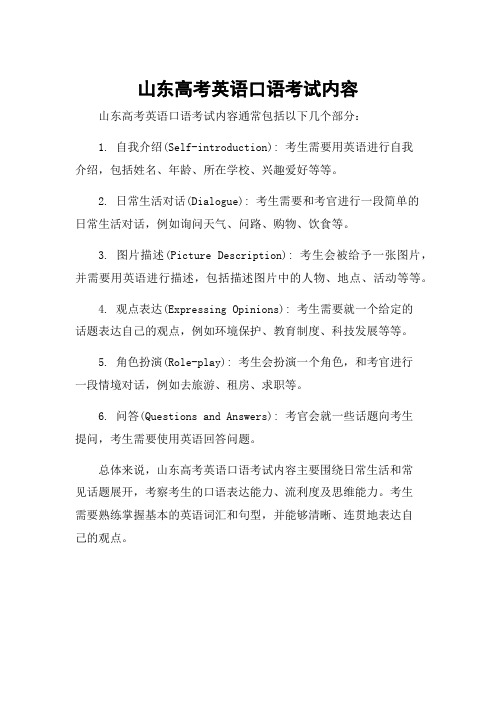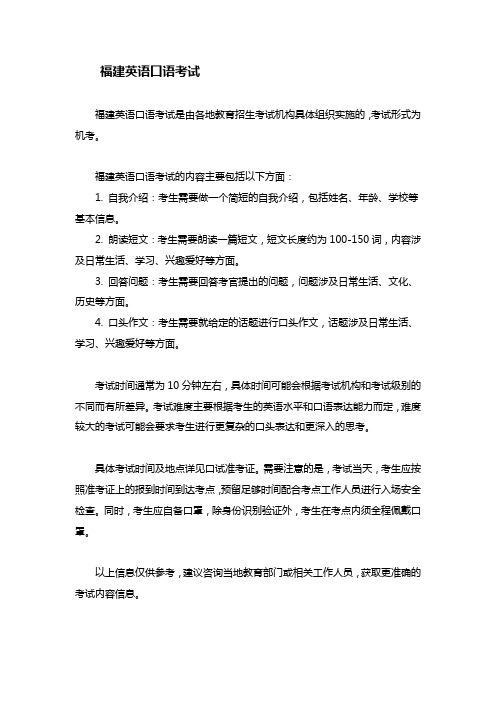TSC口语考试介绍
山东高考英语口语考试内容

山东高考英语口语考试内容
山东高考英语口语考试内容通常包括以下几个部分:
1. 自我介绍(Self-introduction): 考生需要用英语进行自我
介绍,包括姓名、年龄、所在学校、兴趣爱好等等。
2. 日常生活对话(Dialogue): 考生需要和考官进行一段简单的
日常生活对话,例如询问天气、问路、购物、饮食等。
3. 图片描述(Picture Description): 考生会被给予一张图片,并需要用英语进行描述,包括描述图片中的人物、地点、活动等等。
4. 观点表达(Expressing Opinions): 考生需要就一个给定的
话题表达自己的观点,例如环境保护、教育制度、科技发展等等。
5. 角色扮演(Role-play): 考生会扮演一个角色,和考官进行
一段情境对话,例如去旅游、租房、求职等。
6. 问答(Questions and Answers): 考官会就一些话题向考生
提问,考生需要使用英语回答问题。
总体来说,山东高考英语口语考试内容主要围绕日常生活和常
见话题展开,考察考生的口语表达能力、流利度及思维能力。
考生
需要熟练掌握基本的英语词汇和句型,并能够清晰、连贯地表达自
己的观点。
河北高中英语口语考试

河北高中英语口语考试
河北高中英语口语考试主要包括以下内容:
1.自我介绍:考生需要准备一段自我介绍,内容可以包括个人基本信息、兴趣爱好、学习英语的经历等。
此部分主要考察考生的语言组织能力和表达能力。
2.考官问答:考生会与考官进行一段对话,内容主要涉及日常生活中的情景对话以及一些常见话题的讨论。
此部分主要考察考生的听力和口语表达能力。
3.话题陈述:考生需要就给定的话题进行一段口头表达,可以是发表观点、论述事实等。
此部分主要考察考生的思维逻辑和语言组织能力。
英语作文关于口语考试介绍

英语作文关于口语考试介绍Title: Introduction to the Oral ExaminationThe oral examination is an integral part of the English language assessment process, alongside written tests.It evaluates a candidate"s ability to communicate effectively in real-life situations, assessing their listening, speaking, and comprehension skills.This essay aims to provide a comprehensive introduction to the oral examination, highlighting its importance and the various aspects it covers.Firstly, the oral examination aims to assess a candidate"s proficiency in using English for everyday communication.It evaluates their listening skills, which is crucial for understanding and interpreting spoken language.The speaking component tests the candidate"s ability to express their thoughts, ideas, and opinions clearly and coherently.It also examines their fluency, pronunciation, and语调, ensuring that they can communicate effectively with native speakers.Secondly, the oral examination is designed to simulate real-life scenarios, providing candidates with a platform to demonstrate their practical language skills.The examiners evaluate the candidate"s ability to engage in conversations, provide appropriate responses, and maintain a meaningful dialogue.This helps to assess their communication skills, including turn-taking, listening actively, and responding appropriately.Furthermore, the oral examination assesses a candidate"s vocabularyand grammar usage.Candidates are expected to demonstrate their command of the English language by using a wide range of vocabulary and appropriate grammar structures.The examiners look for accuracy, precision, and flexibility in language use, which are essential for effective communication.In addition, the oral examination evaluates a candidate"s cultural awareness and understanding.Candidates are expected to demonstrate an understanding of English culture and traditions, as well as their ability to adapt to different cultural contexts.This includes showing respect for diverse perspectives and being sensitive to cultural differences.Moreover, the oral examination is conducted in a standardized and fair manner.Examinees are evaluated based on their performance against established criteria, ensuring consistency and objectivity in the assessment process.The examination is usually conducted by trained and experienced examiners, who provide constructive feedback to help candidates improve their language skills.In conclusion, the oral examination is a crucial component of the English language assessment process.It evaluates a candidate"s ability to communicate effectively in real-life situations, assessing their listening, speaking, comprehension, vocabulary, grammar, and cultural awareness.By simulating real-life scenarios and focusing on practical language skills, the oral examination provides a comprehensiveassessment of a candidate"s English language proficiency.It is an essential part of language learning and helps candidates improve their communication skills for personal and professional development.。
口语考试说明及试题

口语考试说明及试题一、考试说明口语考试是评估一个人口语表达能力的重要方式之一。
通过口语考试,能够检验考生的语音语调、词汇运用、语法准确性、流利度以及对话交际能力等方面的水平。
以下是口语考试的具体要求和试题。
二、考试要求1. 语音语调:考生的语音应该清晰准确,发音规范,语调自然。
2. 词汇运用:考生应该灵活运用所学词汇,避免频繁重复使用相同的词汇。
3. 语法准确性:考生应该注意句子结构的正确性,正确使用单复数形式、时态等语法知识。
4. 流利度:考生要求能够连贯地表达思想,并且能够适当使用过渡词或短语,使语言更加流畅。
5. 对话交际能力:考生需要展示良好的对话能力,能够适应和回应各种对话场景。
三、试题请根据以下题目进行简短的口语练习。
1. 介绍自己(Introduce yourself)请用1-2分钟的时间,简单介绍一下自己,包括姓名、年龄、职业/学生身份以及家庭背景等信息。
2. 描述图片(Describe a picture)请描述一张你喜欢的图片,包括图片中的人物、场景、动作等细节,以及你对这张图片的感受。
3. 初次见面(Meeting someone for the first time)假设你在一个派对上第一次见到一个陌生人,请根据自己对对方的外貌举止等方面的观察,介绍一下这个人并表达你的印象。
4. 喜欢的电影(Favorite movie)介绍一部你最喜欢的电影,包括电影的类型、剧情梗概以及你为什么喜欢这部电影。
5. 旅行经历(Travel experience)请描述一次你难忘的旅行经历,包括目的地、时间、景点以及你对这次旅行的感受。
以上是口语考试的说明和试题,希望考生在口语考试中能够准确表达自己的思想,发挥出最好的口语表达能力。
祝各位考生顺利通过口语考试!。
英语口语考试内容及形式

英语口语考试内容及形式英语口语考试是测试考生口语能力的一种评估方式。
它通常包括听力、口语表达和交流的各种题型。
下面是一种常见的英语口语考试形式和内容。
英语口语考试的形式通常是面试或交流的形式。
考官会通过与考生进行对话的方式评估其口语能力。
考试时间一般为10到20分钟。
在考试中,考生需要回答一系列的问题,进行交流并展示他们的英语口语能力。
以下是一些常见的英语口语考试内容:1. 自我介绍:考生需要自我介绍,包括姓名、年龄、职业、兴趣爱好等。
2. 日常生活:考官会询问考生关于日常生活的问题,如工作、学习、家庭、朋友、旅行、购物等。
3. 兴趣爱好:考官可能会询问考生他们的兴趣爱好,如音乐、电影、运动、读书等。
考生可以进一步展开对这些话题的讨论。
4. 个人经历:考官可能会要求考生谈论他们的人生经历,如学习经历、工作经验、旅行经历等。
考生需要用英语清晰地表达自己的经历和感受。
5. 社交场景:考官可能模拟一些社交场景,考生需要通过对话展示他们在不同情境下的交流能力,如预订机票、订餐、询问路线等。
6. 对话和交流:考官可能会进行一些对话和交流,考生需要根据考官的问题做出回答,并通过互动展示他们的口语表达能力。
在口语考试中,考生需要用流利、准确的英语回答问题,展示他们的词汇、语法和语音技巧。
同时,他们还需要能够灵活运用所学的知识,以及具备良好的沟通和交流能力。
以上就是关于英语口语考试的形式和内容的一个简要介绍。
希望对你有所帮助。
如果你还有其他问题,欢迎继续提问。
英语口语考试题纲

下面是一些参考提纲,可以帮助您准备英语口语考试:1.介绍自己自我介绍:姓名、年龄、家乡等。
现状描述:目前的工作或学习情况。
兴趣爱好:喜欢做什么,平时如何度过闲暇时间。
•例句:Hello, my name is John and I'm from Los Angeles, California. I currently work as an IT specialist for a tech company.•My name is Sarah and I'm 35 years old. I grew up in New York City and I'm currently working as a freelance writer.•Hi, I'm Alex and I'm from Chicago. I'm currently studying law at Harvard University.2.家庭与朋友家庭情况:家人成员数量和关系,家人有没有共同爱好等。
朋友情况:最好朋友是谁,普遍都有哪些共同点,有没有一起做过特别有意义的事情。
•例句:I have two younger sisters and we're all really close. We love going to the beach and playing board games together.•My best friend's name is Anna and we've been friends since high school. We both love hiking and exploring new trails.•I come from a big family with lots of cousins and relatives. We often organize family reunions and get-togethers during holidays.3.教育经历学校背景:毕业于哪所学校,主修专业是什么。
天津英语口语考试内容

天津英语口语考试内容The Tianjin English Spoken Test is an integral part of the language proficiency assessment in the city, focusing on evaluating the candidates' fluency, pronunciation, vocabulary, grammar, and language comprehension. This article aims to delve into the contents of the Tianjin English Spoken Test, providing insights into its format, key evaluation criteria, and strategies for effective preparation.**一、考试内容与格式**The Tianjin English Spoken Test typically consists of three main sections: self-introduction, topic discussion, and interactive interview.1. **自我介绍(Self-Introduction)**:In this section, candidates are required to introduce themselves briefly, highlighting their personal details, interests, and any relevant experience. This serves as a warm-up exercise and helps the examiner assess the candidate's basic language skills.2. **话题讨论(Topic Discussion)**:Candidates are presented with a topic and are given a few minutes toprepare and then deliver a speech on the topic. This section tests the candidate's ability to organize ideas, use appropriate vocabulary, and speak fluently. Topics range from daily life to social issues, requiring candidates to demonstrate a broad range of language skills.3. **互动面试(Interactive Interview)**:In this section, candidates engage in a conversation with the examiner, discussing various topics in a more informal setting. This evaluates the candidate's ability to understand and respond to questions, as well as their ability to use language in real-life situations.**二、评价标准**Candidates are evaluated based on the following criteria:1. **语音语调(Pronunciation and Intonation)**:Candidates are assessed on their pronunciation clarity, accuracy, and intonation. A good pronunciation helps in making the message clearer and easier to understand.2. **词汇与语法(Vocabulary and Grammar)**:The use of appropriate vocabulary and correct grammar is crucial in the spoken test. Candidates are expected to use a range ofvocabulary and express themselves grammatically correctly.3. **流利度(Fluency)**:Candidates are evaluated on how smoothly they speak, without hesitation or pauses. Fluency indicates confidence and familiarity with the language.4. **语言理解与应用(Language Comprehension and Application)**:Candidates are tested on their ability to understand and respond to questions, as well as their ability to use language effectively in different contexts.**三、备考策略**1. **模拟练习(Mock Tests)**:Practicing mock tests helps candidates familiarize themselves with the test format and evaluate their performance. It also helps identify areas of improvement.2. **积累词汇与语法(Vocabulary and Grammar Building)**:Candidates should focus on expanding their vocabulary and mastering basic grammar rules. This will enhance their ability to express ideas clearly and accurately.3. **听力训练(Listening Practice)**:Listening to native speakers and understanding different accents helps candidates improve their language comprehension skills. It also prepares them for the interactive interview section.4. **口语练习(OralPractice)**:Regular practice speaking in English, either with a tutor or a language exchange partner, helps candidates improve their fluency and pronunciation.In conclusion, preparing for the Tianjin English Spoken Test requires a combination of strategic planning, regular practice, and attention to detail. By following the above-mentioned strategies and focusing on improving their language skills, candidates can confidently face the challenge and achieve their desired results.**天津英语口语考试深度解析与备考策略**天津英语口语考试是评估考生英语语言能力的重要环节,主要考察考生的流利度、发音、词汇、语法和语言理解能力。
福建英语口语考试

福建英语口语考试
福建英语口语考试是由各地教育招生考试机构具体组织实施的,考试形式为机考。
福建英语口语考试的内容主要包括以下方面:
1. 自我介绍:考生需要做一个简短的自我介绍,包括姓名、年龄、学校等基本信息。
2. 朗读短文:考生需要朗读一篇短文,短文长度约为100-150词,内容涉及日常生活、学习、兴趣爱好等方面。
3. 回答问题:考生需要回答考官提出的问题,问题涉及日常生活、文化、历史等方面。
4. 口头作文:考生需要就给定的话题进行口头作文,话题涉及日常生活、学习、兴趣爱好等方面。
考试时间通常为10分钟左右,具体时间可能会根据考试机构和考试级别的不同而有所差异。
考试难度主要根据考生的英语水平和口语表达能力而定,难度较大的考试可能会要求考生进行更复杂的口头表达和更深入的思考。
具体考试时间及地点详见口试准考证。
需要注意的是,考试当天,考生应按照准考证上的报到时间到达考点,预留足够时间配合考点工作人员进行入场安全检查。
同时,考生应自备口罩,除身份识别验证外,考生在考点内须全程佩戴口罩。
以上信息仅供参考,建议咨询当地教育部门或相关工作人员,获取更准确的考试内容信息。
- 1、下载文档前请自行甄别文档内容的完整性,平台不提供额外的编辑、内容补充、找答案等附加服务。
- 2、"仅部分预览"的文档,不可在线预览部分如存在完整性等问题,可反馈申请退款(可完整预览的文档不适用该条件!)。
- 3、如文档侵犯您的权益,请联系客服反馈,我们会尽快为您处理(人工客服工作时间:9:00-18:30)。
汉语口语考试(TSC)介绍
什么是TSC
TSC汉语口语考试的前身是SST考试,即英语Samsung Speak Test(三星职员汉语口语考试)的缩写,是由韩国大型跨国集团三星集团人力开发院主持开发的。
TSC是英语Test of Spoken Chinese(汉语口语考试)的缩写,由韩国最大的教育集团YBM/si—sa研制主考,TSC考试自2006年推广以来受到了考生的欢迎,考生们的考试成绩当作派遣驻外工作人员的重要选拔标准之一。
TSC考试采取无纸化考试形式,即CBT(ComputerBasted Test),可以多人同时考试,节省了时间提高了考试效率。
TSC考试同时借鉴了美国OPI(Oral Proficiency Interview)的研究成果,模拟一种近似于面试的考试情景,增强了考试的实效性,最大限度地减少心理因素对应试者的影响。
TSC考试力求口试结果的信、区分度与客观性,注重口试过程的规范化。
TSC考试的7部分内容
TSC口语考试共有自我介绍、看图回答、快速回答、简短回答、拓展回答、情景应对和看图说话七个部分,共有26个问题。
①口语考试的第一部分是自我介绍,用来评估考生的“语音印象”、确定考生身份,回答并不计入总成绩。
②第二部分看图快速回答共有四个问题。
比如考生先看到一幅画,然后听到一个问题,两秒钟后将会听到提示音,提示考生开始回答问题。
③第三部分是情景快速回答,共有五题,要求考生要扮演对话其中一人的角色,对问题做出合理的回答。
④第四部分,简短回答共有五个问题。
问题紧密联系考生的生活,从考生回答的流畅度和词汇可以判别考生的汉语水平。
⑤第五部分拓展回答有四道题,这部分一般是热点话题或热点社会现象,我们可以称之为“观点题”,即回答“怎么看、怎么认为”的题。
考生回答的时间是50秒,回答要言之有物。
⑥第六部分是情景应对题,共有三道题。
问题本身就是假设一种情境,要求考生对这种情况提出解决的方法,这部分题我们可以称之为“解决题”。
考生需
要自己给自己假设一个时间或场所,比如上下班高峰时间、学校附近、公司附近等等,这样具体化情境能帮助顺利回答。
⑦第七部分看图说话,要求考生在90秒内描述看到的四幅图画,并把四幅图画串联成一个故事,要求考生具有长文表述的能力。
试题编排顺序及评定标准
TSC口语考试的七个部分是按照初、中、高的顺序安排的,逐级增加考试难度,能客观地反映应试者的口语水平。
考试成绩分为10级,1—2级是初级,3—7级为中级,8—10级为上级(高级)。
评测考试成绩的标准有流利度、语音、语法和词汇。
考生成绩是语言综合能力的提高,而不单单是扩大的词汇量。
考试所针对的对象
TSC口语考试,是以国际化口语考试为模板,继SST(三星职员汉语口语考试)后推出的考试,目前考试针对的对象多以韩国企业公司为主,是韩国企业派遣、推荐人才的重要依据。
当然,也有许多留学生、少数民族、各国外企工作人员等参加过汉语口语考试。
国内报考城市
截止目前,北京、上海、广州、西安四个城市已经成功引进了TSC考试。
2015年11月8日,西安将举办今年的第二次TSC考试。
